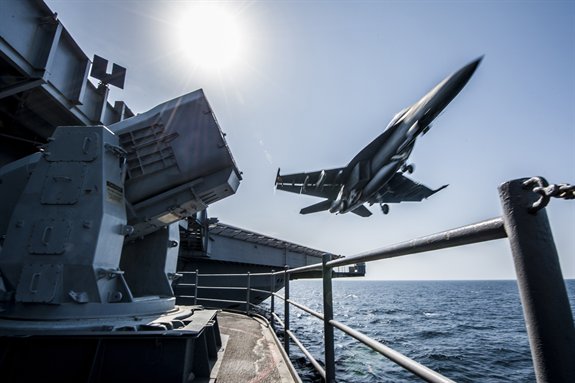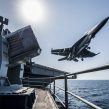
BRIEFS
Publication: Terrorism Monitor Volume: 12 Issue: 23
By:

AIRSTRIKES, GROUND OFFENSIVES PUT ISLAMIC STATE ON THE BACK FOOT
James Brandon
During the last two weeks, a series of mainly military developments have inflicted significant damage on the Islamic State organization, as the power of the extensive international coalition ranged against it begins to take effect.
Military jets and drones operated by the United State and, to a far lesser extent, its coalition partners have continued to strike a number of Islamic State targets in region, with the U.S.’s Western allies focusing on Iraq (where they can claim to be supporting the Iraqi government) and its other, mainly Arab, allies on targets on Syria. The effect of the attacks is disputed. The Australian military, for instance, claimed that one series of airstrikes on “a large, well-established and hidden network of caves and bunkers” near Kirkuk in Iraq had killed as many as 100 Islamic State fighters and that the “advance of ISIL [the Islamic State] across Iraq has slowed” (Sydney Morning Herald; ABC (Australia), November 25). The Syrian foreign minister, however, said that the Islamic State organization was “not weaker” due to the airstrikes and repeated his calls for Turkey to be forced to “control its borders” and stop the flow of jihadist fighters into Syria (al-Mayadeen TV, November 28). Iranian Air Force F-4 Phantom jets also carried out airstrikes in areas of Iraq bordering Iran, reportedly with tacit U.S. approval; their exact targets were unclear (Haaretz, December 2).
Backed by such airstrikes, and no doubt various foreign special operations forces, Iraqi Kurdish forces claimed in late November to have taken back five villages south of Erbil, in the Gweir and Makhmour areas (al-Jazeera, November 30). The Islamic State’s capture of these villages this summer was key in promoting international intervention, amid concern that Iraqi Kurdistan was itself threatened by the organization’s advance. Meanwhile, additional Iraqi state-backed Shi’a militia forces arrived in Kirkuk on November 29-30 to further bolster local defences against Islamic State forces; local media reports described these as being the al-Ahbab and al-Nasr brigades, allegedly operating with the assistance of Iran’s Revolutionary Guard Corps (IRGC) and being equipped with heavy artillery and missiles (Rudaw, December 1). The units reportedly dug themselves in on arrival, even digging a trench around their encampment; an unusual step that suggests – by Iraqi standards at least – a higher than usual level of discipline and training, which in turn suggests these units could play an important role in tackling the Islamic State organization in the region.
Meanwhile, in the Syrian Kurdish-majority city of Kobane, the Islamic State organization has been pushed back through a mixture of airstrikes and Kurdish ground troops. In one 24-hour period alone, on November 29, over 50 Islamic State fighters were reportedly killed in the town, its heaviest daily loss there to date (al-Jazeera, November 30). Then on December 2, 150 fresh Iraqi Kurdish troops were rotated into Kobane through Turkey, partly relieving existing Kurdish forces there, a luxury that the hard-pressed Islamic State forces do not enjoy (Rudaw, December 2). Kurdish forces now claim to control the majority of Kobane, although they say that Islamic State forces have heavily mined areas of Kobane still under the militant group’s control (al-Arabiya, November 29).
The recent fighting has cost the Islamic State organization some of its highest profile figures. These include Islam Yaken, a wealthy, formerly liberal, Egyptian volunteer who was one of Islamic State’s social media stars (al-Arabiya, December 2). In addition, the increased fighting has killed some of the organization’s prized Western volunteers. A British citizen of east African origin, Abu Musa al-Sumali, was reportedly killed in fighting near Kirkuk, although his death has not been confirmed by the UK government (Daily Mail, December 1). In addition, a British convert of Christian Eritrean origin, known as Abu Abdullah al-Habashi, and another man from London called Abu Dharda were killed in Kobane, either by airstrikes or by Kurdish fighters (BBC, November 22). Claims made by Iraqi state TV that Abu Bakr al-Baghdadi, the Islamic State’s leader and self-styled “Caliph,” was wounded in an airstrike have not been verified, however, and appear unlikely to be true. Al-Baghdadi suffered a personal setback in late November when one of his wives and his son were reportedly arrested while crossing into northern Lebanon from Syria; his wife remains in detention and is being interrogated (Daily Star [Beirut], December 2). Given Hezbollah, Iranian and Western influence over the Lebanese security services, this potentially gives anti-Islamic State forces some personal leverage over al-Baghdadi, as well as putting increased psychological pressure on the militant leader. The Iraqi government, however, has disputed the woman’s identity.
BEHEADING OF POLICEMAN IN TUNISIA ILLUSTRATES CONTINUING JIHADIST THREAT
James Brandon
On November 30, armed men stopped a civilian car near the city of El Kef, which is located in northwest Tunisia close to the Algerian border. When they found that one of the two men in the car was an off-duty policeman, they abducted him and drove off in the vehicle. The following day the policeman’s body was found near the town of Touiref, seven miles north of El Kef. He had been beheaded (Reuters, December 1). No group has yet claimed responsibility for the attack, but it was almost certainly carried by one of the country’s small jihadist cells that have periodically been active along the Algerian border since Tunisia’s 2011 revolution.
In response to the attack, the police union has called for off-duty policemen to be allowed to carry arms, especially in areas affected by terrorism, an indication that the security services feel increasingly targeted by militants (La Presse [Tunis], December 2). A previous attack near El Kef earlier in the month had also targeted the security forces when five soldiers were killed when gunmen attacked their bus (Magharebia, November 6). In addition, on December 1, underling the threat from militancy, a mine or improvised explosive device (IED) attack struck an army vehicle in the Kasserine region, also located in northwest Tunisia, killing one soldier and injuring another (La Presse [Tunis], December 2). The incident occurred as the army was conducting land and air operations against suspected jihadist hideouts in the Jebel Sammama area.
These attacks underline that small jihadist groups remain active along parts of the border region, where they primarily stage small attacks and ambushes against the security forces. In response, the government is engaged in almost continuous counter-terrorism operations along the Algerian border area. For instance, on December 1, the Tunisian Ministry of the Interior said that five suspected terrorists had been arrested in the Mount Chaambi area of Kasserine province, as part of a fresh government anti-terrorism sweep (Tunis Afrique Presse, December 1). In October, the government said that it had so far arrested 1,500 suspected jihadists during the year to date (al-Arabiya, November 6).
The latest abduction and beheading of the police officer comes as Tunisia is midway through its election process, with the first round of presidential elections having taken place on November 23 and the final round being scheduled for December 28. Although militants have not, so far, targeted the elections – perhaps because they thought this would excessively alienate the Tunisian populace – the latest attacks nonetheless show that, despite broad support for democracy in Tunisia, jihadists remain active in the country and continue to pose a threat, particularly in rural and outlying areas. This is underlined by the disproportionately large presence of Tunisian jihadists in Syria and Iraq; according to recent research around 5,000 Tunisian fighters have joined that conflict (al-Hayat, November 3).





